Ambulance strike: Poor pay impacting our health, says worker
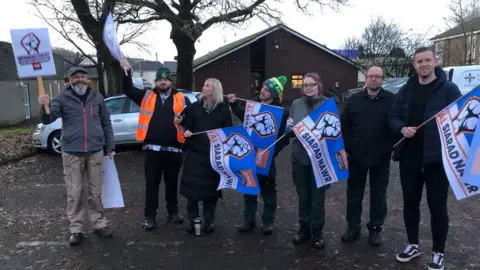 BBC
BBCPoor pay is affecting the health and wellbeing of some ambulance workers and their ability to do the job, according to one worker.
Ian James, 59, said voting in favour of strike action was difficult, but necessary to improve conditions.
GMB members of the ambulance service in Wales are striking on Wednesday in a dispute over pay.
Wales' health minister said people should only call 999 for serious emergencies during the strike.
Mr James is an emergency medical technician and has worked for the ambulance service for 30 years, as well as serving as a branch secretary for the union.
He cited examples of colleagues who at one time were able to have "fresh vegetables and food on a regular basis to now having less quality foods - even to the point where some members of staff are having to use food banks".
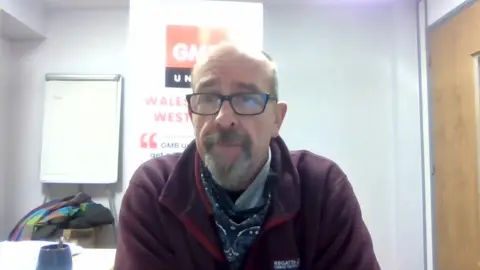
"That does seriously impact on your ability to function at the highest level, which you need when dealing with patients, the public, drugs, driving," he added.
"All those things are impacted by your health and wellbeing."
Members of the GMB union - which makes up about a quarter of the ambulance service in Wales - are striking for 24 hours, ending at midnight on Wednesday.
The Welsh government has given workers an average pay rise of 4.75%, but with inflation running at more than 10%, unions say this represents a pay cut in real terms.
Unison did not meet the threshold for industrial action in Wales, though it's expected to re-ballot its members in the new year, while the results of Unite's ballot is due later this week.
In England all three unions are taking action, though bosses in Wales are also preparing for non-GMB members to strike in support.
Calls to the service will still be answered and the most urgent, life-threatening calls - roughly 15% of the total call volume - will be responded to.
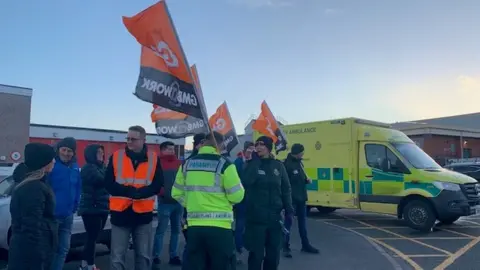
The expectation is that many patients - even those who are seriously ill - will simply not get an ambulance response.
Exemptions are also in place so that should the most urgent "red calls" come in, bosses can ask for striking crews to return to work, though staff can refuse.
At Pentwyn service station in Cardiff, all striking members were called away from the picket line on emergency calls.
Handover delays are often lengthy, Mr James said.
"The public can be assured that no life or limb would be put in jeopardy from a patient being left on the back of an ambulance, that will not happen," he explained.
"We would hand over that patient as safe and securely as possible."
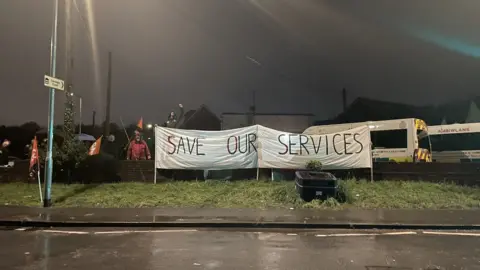
He said the current pressures on the service meant there were reduced opportunities to mentally process what they deal with, which in turn is affecting how long staff stay in the service.
"People put a brave face on a lot of things they do, particularly with the ambulance service, where they are dealing with catastrophic incidents on a regular basis.
"It used to be that you would 'depressurise' on station, but now handovers are so difficult that as soon as you come through that door they're looking to cover jobs.
"So you're straight on the vehicle, checking your equipment and straight out that door. You don't get the 'depressurisation' that we used to have."
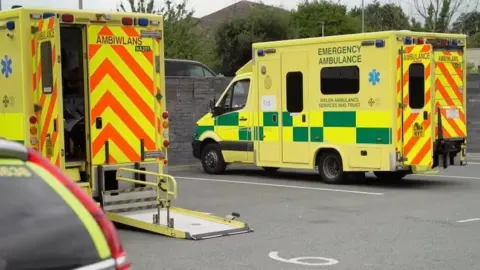
Sharon Thorpe, a relief paramedic for the Welsh Ambulance Service in Newport, called the action a "necessity" to preserve the service for patients.
Speaking to BBC Radio Wales Breakfast, she said: "Actually putting that tick in that box for action was a massive decision for me.
"This is my 30th year in the ambulance service. We've had ballots before, and I've never ticked that box before, [but] there has been years of underfunding in the health service and its staff.
"To help people in their darkest times and then go home and possibly have to visit a foodbank to feed your children is unacceptable."
Ms Thorpe, a picket supervisor supporting striking colleagues, added: "I don't think there is one of us here today who feels good about this, but it's a necessity. People in the NHS are the service, and the service will last as long as there are people to fight for it.
"The service that we give our patients is, at the moment, not fulfilling what we would want. Patient experience is dire, staff are struggling. Things have to change."
Richard Collyer, an emergency medical technician and GMB Union lead in Carmarthenshire, added that the current wage was having "a massive effect on ourselves and our families financially because we can't support them as well as we should be".
"I get paid £11.24 an hour. For the work that we do and the lives that we save and the trauma and the horrific things that we see on a daily basis, £11.24 is not enough."
He added that the decision to walk out had been taken with "a very heavy heart".
Allow X content?

Jason Killens, head of the Wales Ambulance Service, said about half of crews were working normally overnight and the other half were responding only to top tier emergencies or taking full strike action.
He added: "Pressure on the service has been sustained and has been extreme for many months. Today, so far, we've seen activity perhaps be slightly kinder than we've seen in recent weeks."
He said while pleas for hospitals to free up ambulances quickly had been met, the impact was still significant.
"Patients are likely to continue to come to some degree of harm during the strike action. But the issue for us over the last few days has been planning as best we can for today to mitigate the impact of the action," he said.
He suggested that factors beyond pay, such as workplace environment, long handover delays outside hospitals and late finishes had influenced some workers' decisions and urged unions and ministers to "get round the table".
"I do have sympathy with them for the circumstances they're working in. It is deeply frustrating for them and for me because we can't provide the service that people need," he added.
The Welsh government said about 2,800 outpatient appointments and 250 planned operations were postponed in Wales on Tuesday.
It said that did not reflect the full impact on planned NHS care, as fewer operations and appointments were booked in than normal.
Health Minister Eluned Morgan said people should not add extra pressure on services on strike days and consider carefully what activities they take part in.
"There's no doubt the two days of industrial action, following hard on the heels of action by nurses which have caused a delay in treatment for thousands of patients in Wales, are going to cause huge pressure on ambulance services. Ambulances will only be able to respond to the most urgent calls on strike days," she said.
"It's important to call 999 if you are in immediate danger, but we must all consider very carefully how we use ambulance services on these days."



Use this form to tell us about your experiences:
If you are reading this page on the BBC News app, you will need to visit the mobile version of the BBC website to submit your question on this topic.
